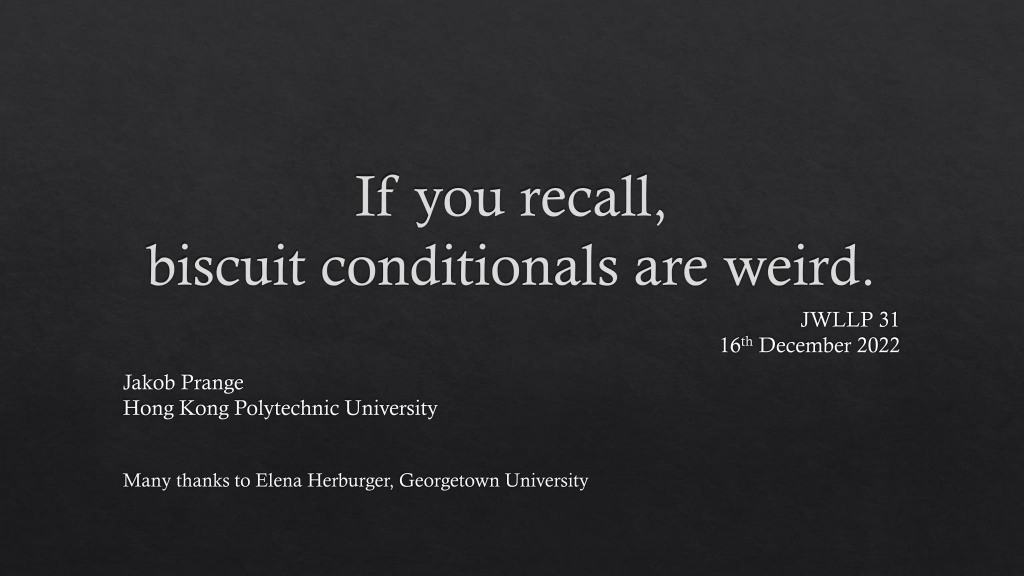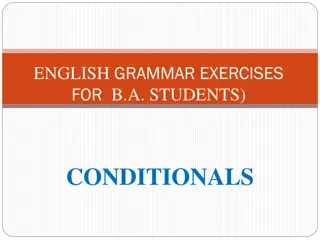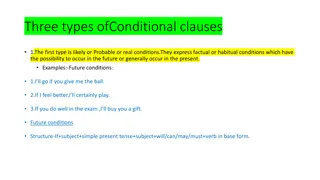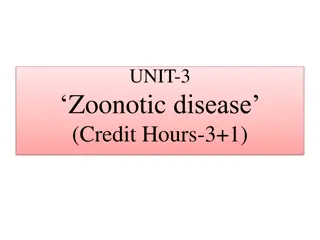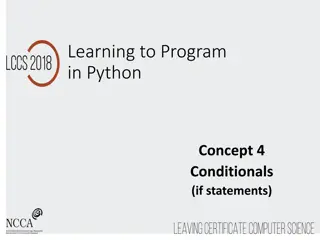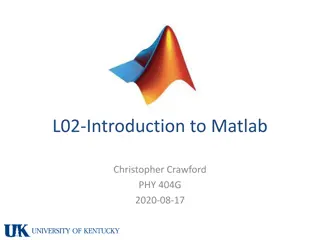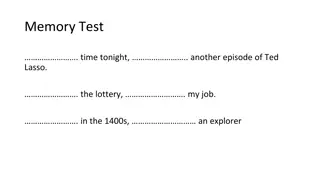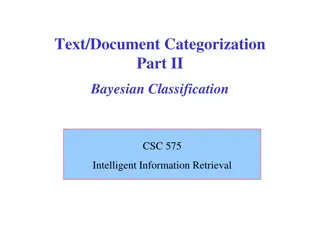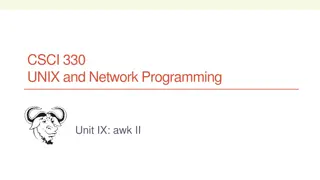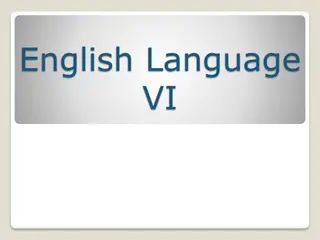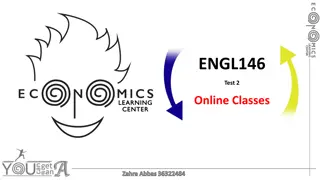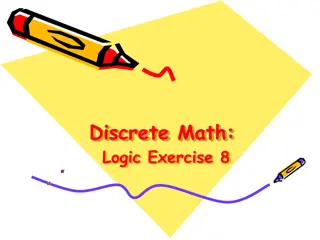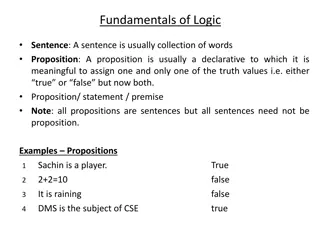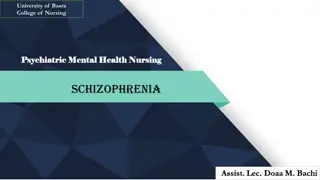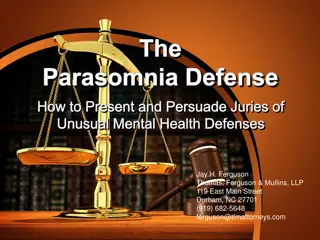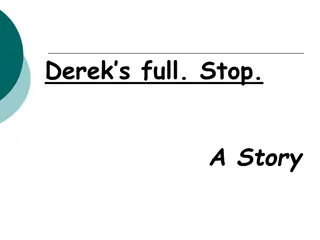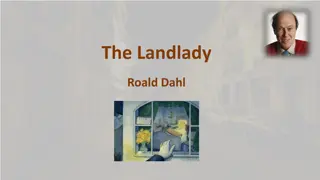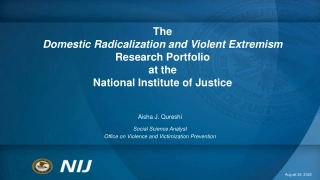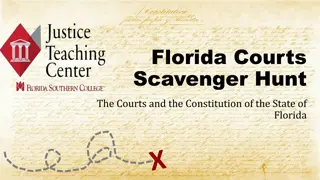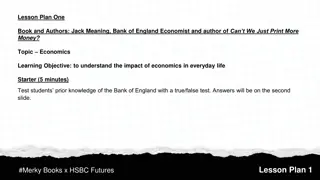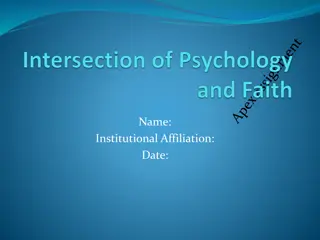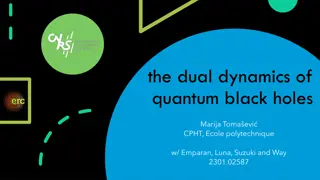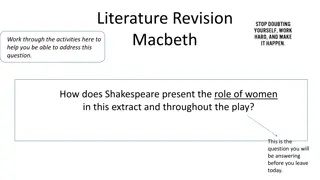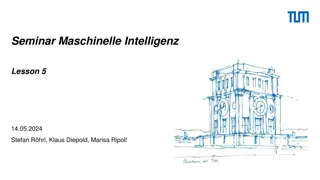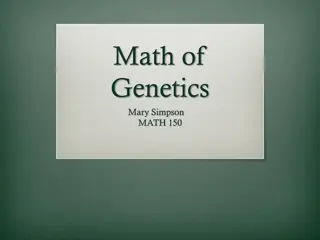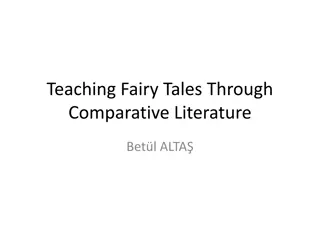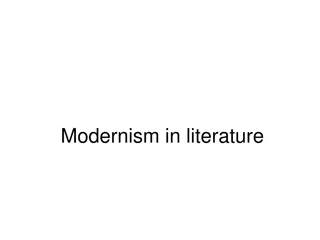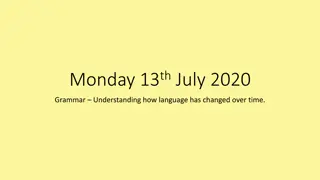Bizarre Biscuit Conditionals: Exploring JWLLP 31 by Jakob Prange
Delve into the peculiar world of biscuit conditionals as discussed in JWLLP 31 by Jakob Prange at Hong Kong Polytechnic University. The influence of J L Austin's work is evident in this intriguing exploration of language and logic, with a nod to Elena Herburger of Georgetown University.
Download Presentation

Please find below an Image/Link to download the presentation.
The content on the website is provided AS IS for your information and personal use only. It may not be sold, licensed, or shared on other websites without obtaining consent from the author. Download presentation by click this link. If you encounter any issues during the download, it is possible that the publisher has removed the file from their server.
E N D
Presentation Transcript
If you recall, biscuit conditionals are weird. JWLLP 31 16thDecember 2022 Jakob Prange Hong Kong Polytechnic University Many thanks to Elena Herburger, Georgetown University
WRONG RESPONSE! There are biscuits on the sideboard if you want them. J L Austin, 1961 But there is a response system involved here! 2 https://xkcd.com/1652
Outline The two types of conditionals and their functions Two attempts at a unifying mechanism How many types are there, really? A hearer-focused account 3
Two types of conditionals and their functions 4
5 https://xkcd.com/1033
Two types of conditionals Genuine conditional (GCs) Logical, standard, normal Non-conditional conditionals (NCCs) Well, they re weird. If then If doesn t mean if ? Truth-functional Not really about truth? But what, then, are they about? p q T F T T p T T F F q T F T F 6
Geis & Lycan (1993): Functional & Descriptive Properties Properties of Genuine Conditionals A: can add "then" to consequent without change in meaning B: can add "only" to antecedent C: consequent inferable from antecedent + contextual assumptions D: Contraposition and Modus Tollens hold E: Equivalence to disjunction holds F: can be put in subjunctive / counterfactual with similar meaning G: intuitively conditional H: antecedent and consequent are not asserted, but entire sentence is asserted (as opposed to conditional assertion of consequent) NCCs do not have these properties! Genuine conditionals and NCCs are on a spectrum NCCs *usually* do not have *most of* these properties, while GCs *usually* do have *most* of them 7
Geis & Lycan (1993): Functional & Descriptive Properties Function of GCs: Convey conditional dependency between p and q Function of NCCs: Convey q, with p as felicity/relevance condition or face-threat mitigation 8
Csipak (2014): Discourse-structuring Conditionals NCC GC 9 If you promise not to tell anyone, Kirsten is asleep.
Conditionals around the World Chinese If Then If- result In-accordance-with- result 10
Conditionals around the World German Wenn If Dann Then Also: when 11
Conditionals around the World If you fail an exam, you have to repeat a year. , Wenn du eine Pr fung nicht bestehst, musst du ein Jahr wiederholen. If you think of going anywhere tomorrow, let me know. Wenn du vorhast morgen auszugehen, sag bescheid. Explicit speech act consequent If you think of going anywhere tomorrow, I m available. Wenn du vorhast morgen auszugehen, ich habe Zeit. Biscuit 12
Conditionals around the World If you fail an exam, (then) you have to repeat a year. ,( ) ) Wenn du eine Pr fung nicht bestehst, (dann) musst du ein Jahr wiederholen. If you think of going anywhere tomorrow, (?then) let me know. (? (? ) ) Wenn du vorhast morgen auszugehen, (?dann) sag bescheid. If you think of going anywhere tomorrow, (#then) I m available. (# (# ) ) Wenn du vorhast morgen auszugehen, (#dann) habe ich Zeit. 13
German (and Dutch) Word Order Standard main clause order: V2 Wenn du eine Pr fung nicht bestehst, musst du ein Jahr wiederholen. If you fail an exam, must you a year repeat Biscuit word order # Wenn du vorhast morgen auszugehen, habe ich Zeit. If you think of going anywhere tomorrow, have I time Wenn du vorhast morgen auszugehen, ich habe Zeit. I have time 14
German (and Dutch) Word Order Davison (1983): Word order triggers biscuitness. Kroeger (2022): Biscuit antecedent is not a constituent of the main clause at all; it attaches to some higher node in the sentence. Csipak (2015, 2017): Speaker preference, not grammaticalized. 15
Two attempts at a unifying mechanism We not only need to explain each type of conditional separately, but also describe a mechanism by which they can be distinguished during on-line processing. 16
DeRose & Grandy (1999): Unification as Conditional Assertion Indicative non-biscuit conditionals do not assert if p then q since this does not have a truth value and hence is not assertible. Rather, ALL indicative conditionals, biscuit or not, are conditional assertions. 17
DeRose & Grandy (1999): Unification as Conditional Assertion Assertion of Conditional Conditional Assertion if p: assert q assert (q if p else True) assert (not p or q) else: pass 18
DeRose & Grandy (1999): Unification as Conditional Assertion Unified through as single semantico-pragmatic mechanism Thus, no need to distinguish separate types Problematic for non-biscuit conditionals, because antecedent s truth value is unknown at time of utterance So it would have to be counterfactual/future conditional assertions If p was known and p were T, Speaker would assert q Once p turns out to be T, Speaker will assert q If p was known and p were F, Speaker would not assert q If p turns out to be F, Speaker will not assert q Biased towards NCCs 19
Csipak (2017): Unification as Truth-Semantic Truth-functional conditional Antecedent and consequent are conditionally dependent yes no Hearer wonders why speaker used conditional construction nonetheless Truth-functional conditional is asserted Pragmatic inference Hearer concludes that speaker is uncertain about antecedent Hearer further concludes that, since antecedent and consequent are conditionally independent, speaker must have independent evidence for consequent. NCC 20 Consequent is asserted
Csipak (2017): Unification as Truth-Semantic Truth-functional conditional Antecedent and consequent are conditionally dependent yes no Hearer wonders why speaker used conditional construction nonetheless Truth-functional conditional is asserted Pragmatic inference Hearer concludes that speaker is uncertain about antecedent Hearer concludes that speaker is uncertain about consequent Hearer further concludes that, since antecedent and consequent are conditionally independent, speaker must have independent evidence for consequent. Hearer further concludes that, since antecedent and consequent are conditionally independent, speaker must have independent evidence for falsity of antecedent. p q T F T T p T T F F q T F T F NCC 21 Consequent is asserted Antecedent is denied
Csipak (2017): Unification as Truth-Semantic Unified at semantic level Distinction between different types is multi-step pragmatic inference Predicts function of NCCs to be assertion of consequent + assertion of uncertainty about antecedent? Mechanism for deducing the latter demands too much from the hearer Biased towards GCs 22
How many types are there, really? Genuine conditional If you fail an exam, you have to repeat a year. Explicit speech act consequent If you think of going anywhere tomorrow, let me know. Biscuit If you think of going anywhere tomorrow, I m available. Discourse-structuring (Implicit speech act antecedent) If you promise not to tell anyone, Kirsten is asleep. Half Biscuit, Half Speech act? If you don t mind, I m trying to read. Reverse biscuit-speech-act? If you recall, biscuit conditionals are weird 24
Yes. 27 Adapted from https://xkcd.com/974
Involving the hearer Geis & Lycan, DeRose & Grandy, and Csipak all focus on truth (either objective or from the speaker s perspective) Csipak involves the hearer, but in a complicated and unnecessarily strenuous way (running through multiple steps of pragmatic inference to determine what is asserted) Cannot account for consequents that are (explicit or implicit) non-assertion speech acts 28
Biscuit Antecedents as Questions Felicity condition for question asking: Hearer has immediate access to antecedent (knows or can change) I claim: Biscuit and discourse-structuring antecedents have the exact same felicity conditions If you re thinking of going anywhere Are you thinking of going anywhere? 29
Biscuit Consequents as Responses to Projected Responses Response in the broad sense: can be about knowing the truth (yes/no) OR about acting upon the obvious truth Rhetorical questions OR about making things true Implicit speech acts 30
Biscuit Consequents as Responses to Projected Responses Antecedent: Are you thinking of going anywhere? Response: Yes. Consequent (response-to-projected-response): I m available. Note that this is really an implicit speech act! 31
Non-Biscuit Antecedents as Questions If you fail an exam Do you fail an exam? Felicity condition of hearer accessibility not met 32
Unification as Projected Discourse Hearer has immediate access to antecedent (knows or can change) no yes Truth-functional conditional is asserted NCC can affect (rhetorical question) knows (genuine question) Antecedent is relevance Antecedent is speech act Consequent is speech-acted (speech act may or may not be assertion) 33
Unification as Projected Discourse Unified at discourse level: Locutionary felicity conditions identical with asking antecedent as a question Distinction mechanism uses familiar pragmatic shortcuts Namely, the same ones used in distinguishing rhetorical from genuine questions Does not predict consequent to be asserted in either case In fact predicts it to usually not be asserted 34
Unification as Projected Discourse Hearer has immediate access to antecedent (knows or can change) no (requires reanalysis) yes Truth-functional conditional is asserted NCC can affect (rhetorical question) knows (genuine question) Antecedent is relevance Antecedent is speech act Consequent is speech-acted (speech act may or may not be assertion) 35
Summary & Directions We inspected different types of conditionals, finding consistent patterns in English, Chinese, and German. We reviewed two previous accounts trying to account for these differences and pointed out their shortcomings. We proposed a new account focusing on the analogy between felicity conditions of biscuit conditionals and question-response patterns. Next, this proposal needs to be tested empirically. 36
